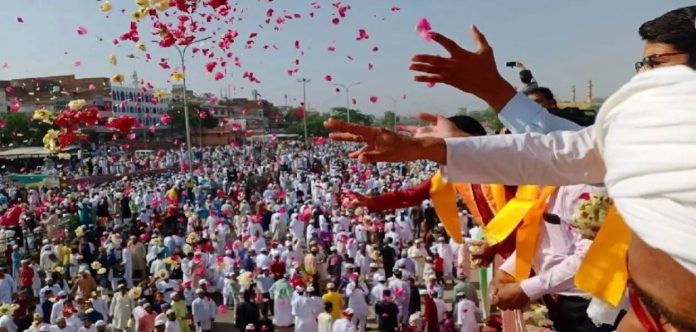Flowers Replace Fear and Hatred Across the Country
– Dr. M. Iqbal Siddiqui
As the crescent moon graced the night sky, heralding the arrival of Eid al-Fitr, communities across India came together in a profound celebration of unity and togetherness. The spirit of Eid was not confined to usual prayers and traditional feasts but was amplified by the resounding message of communal harmony, where people from all walks of life, regardless of faith and background, joined hands to spread love, peace, and brotherhood.
Interfaith Celebrations in Jaipur
Eid al-Fitr, marking the end of Ramadan, has long been a festival that strengthens harmony and benevolence. This year, cities and towns across India witnessed an overwhelming participation of people from diverse religious and social backgrounds, reaffirming that the bonds of humanity supersede all barriers.
In Jaipur, the capital of Rajasthan, the spirit of Eid was celebrated as a festival of humanity, transcending religious boundaries and fostering communal harmony. A grand interfaith gathering saw prominent social and religious leaders come together to extend their heartfelt greetings to the Muslim community.
“Eid is a festival of love and charity, bringing people together across faiths,” said Dr. Rajeev Sharma at an interfaith Iftar gathering in Jaipur.
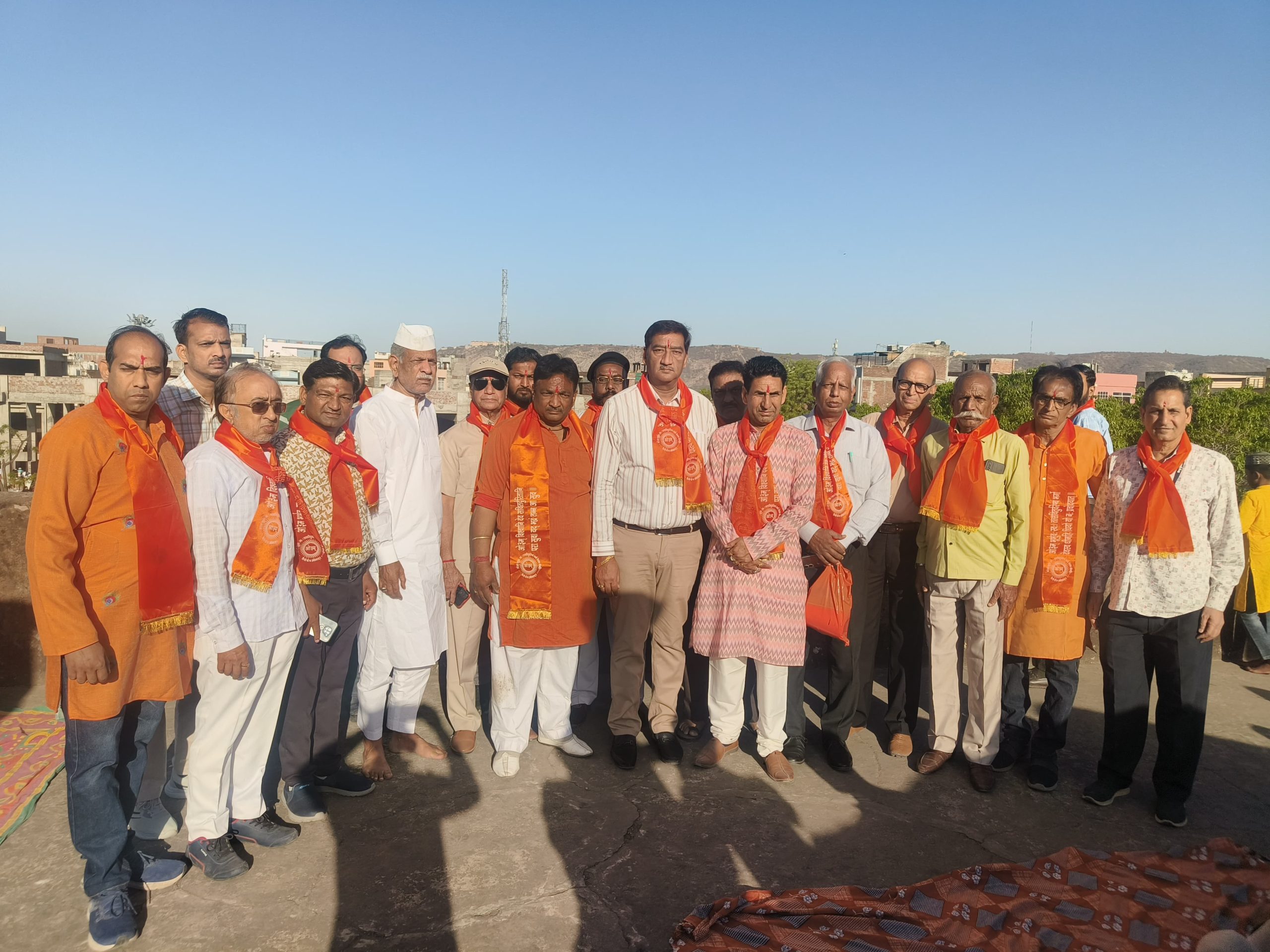
The Hindu-Muslim Ekta Samajik Samiti of Jaipur took the lead in organising these efforts, ensuring that the bonds of brotherhood were strengthened through meaningful interactions. The members of this committee – including Gyanchand Ji Khandelwal, Kailash Yadav, Subhash Lohia, Phoolchand Verma, Mahavir Verma, Geetika Hada, Surendra Singh, Dinesh Sharma, Mazhar Hussain, Yusuf Bhai, and Firozuddin – pioneered the initiative of showering flowers on Eidgah goers, symbolising their respect and goodwill. Later, the office bearers of the organisation gathered at Firozuddin’s residence, where they shared sweets, reinforcing the idea that unity is not merely a symbolic gesture but a way of life.
This sentiment was echoed in the remarkable participation of Hindu and Sikh communities, who actively joined in the celebrations, distributing sweets and embracing their Muslim brethren. Beyond these public celebrations, acts of kindness flourished in many parts of the city. Some families offered sharbat in different localities, expressing their love and warmth towards their Muslim brothers.
Acts of Kindness: Stories of Love and Harmony
Such moments of togetherness were not confined to Jaipur alone. Across different towns and cities, individuals and groups wrote narratives of love and harmony through their active participation in the festival.
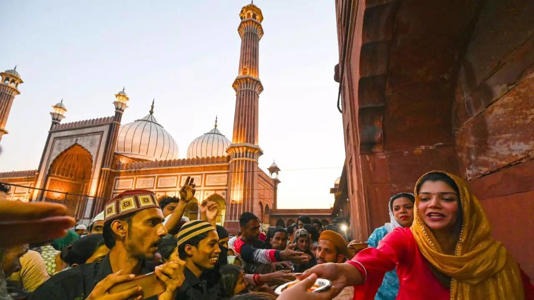
In Delhi, social activist Neha Bharti led an initiative to distribute iftar packets to the Muslims, throughout the month of Ramadan. For her, this act was about more than just charity – it was about challenging stereotypes and promoting solidarity.
“Eid is a celebration of humanity, of sharing and caring,” she remarked while distributing gifts to children, ensuring they, too, felt the joy of the festival.
Neha’s efforts extended further when she distributed Iftar packets to fasting Muslims near Delhi’s iconic Jama Masjid. Her gesture was not just an act of charity but a conscious effort to break barriers and reinforce bonds of solidarity. Similar heart-warming gestures stood as testaments to the power of communal harmony – Hindus and Muslims sitting together, sharing meals, and exchanging greetings, illustrating that peace is not just an abstract idea but a lived experience.
Whether it was a small group of Hindu shopkeepers decorating a mosque for Eid, just as their Muslim friends illuminate temples during Diwali, or community leaders joining hands to celebrate festivals beyond their religious affiliations, every gesture of unity reaffirms that love is stronger than division.
Fostering Communal Harmony Across India
The Eid gatherings across India were not just about festivity but about reaffirming the spirit of peace and fraternity.
In Lucknow, members of the Shia and Sunni communities came together in a joint prayer for peace and social harmony. The event was lauded as a crucial step in strengthening unity among different sects within Islam and setting an example for interfaith amity.
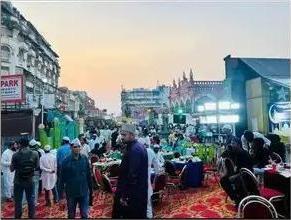
Similarly, in Kolkata, an inter-community feast was organised by Mohammad Salim, a well-known social worker, where people from different religious backgrounds were invited to partake in the traditional sheer-khurma. This simple yet meaningful gathering highlighted how food and hospitality can serve as bridges between communities.
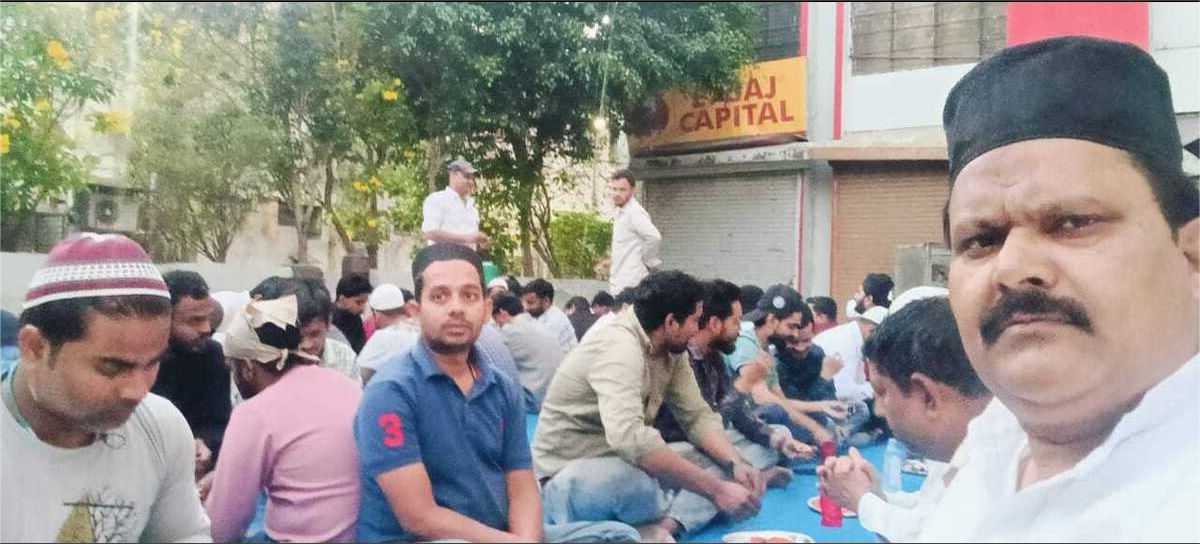 In Prayagraj, a special Ramadan Iftar party was organised by the Hindu-Muslim Unity Committee, led by Manish Agarwal, at the Indira Bhawan Compound in Civil Lines. Manish Agarwal mentioned that the Iftar party aimed to spread the message of goodwill and brotherhood in society.
In Prayagraj, a special Ramadan Iftar party was organised by the Hindu-Muslim Unity Committee, led by Manish Agarwal, at the Indira Bhawan Compound in Civil Lines. Manish Agarwal mentioned that the Iftar party aimed to spread the message of goodwill and brotherhood in society.
Likewise, in Mangaluru, an interfaith Iftar at Yenepoya School Ground, Jeppinamogaru, brought together religious and community leaders to celebrate Ramadan and strengthen interfaith bonds. Organised by Dr. N. Vinaya Hegde, Rev. Dr. Peter Paul Saldanha, and Dr. Yenepoya Abdulla Kunhi, the event highlighted the universal values of love, brotherhood, and humanity.
In Vijayapur, Karnataka, Brahmin priest Keshwar Jagirdar and his wife, Kavita Jagirdar, set an example of interfaith unity by hosting Iftar for fasting Muslims and facilitating Maghrib prayers in their home, showcasing the essence of shared traditions.
In Varanasi, a Hindu shopkeeper, Mishra Ji, has been celebrating Eid with his Muslim neighbours for 30 years, preparing sewaiyan and hosting communal meals that bring people together beyond religious lines. His words, “In Banaras, we don’t see Hindu or Muslim – we see humans,” resonate with the true spirit of India, where mutual respect and shared celebrations continue to break barriers and foster enduring harmony.
Masjids, Mandirs, and Gurdwaras: A Unified Message of Peace
In Delhi, members of the Jain community organised a special Iftar gathering during Ramadan at Digambar Jain Temple in Chandni Chowk on March 30, 2025. The event attracted a diverse group of attendees, fostering a spirit of unity and mutual respect among different religious communities. People from various faiths broke their fast together, emphasising the unity that transcends religious boundaries.
Another gathering, held at Anuvrat Bhawan, saw participation from Islamic scholars, Jain monks, and civil society representatives, all echoing the sentiment that peace and compassion form the core of every faith.
A Ramadan of Shared Compassion
The month of Ramadan itself was filled with gestures of solidarity. In Hyderabad, young volunteers from different faiths actively participated in distributing Iftar meals to the underprivileged. At Charminar, a historical site synonymous with cultural coexistence, an interfaith Iftar was held, attended by people from Hindu, Christian, and Sikh communities, reinforcing the message that fasting is not merely an act of devotion but also one of empathy and understanding.
In Bhopal, an initiative named “Seva Eid” was launched by Muslim and Hindu youth together, where essential food packages were distributed to the needy, regardless of religion.
Manish Dubey, one of the coordinators of the initiative, remarked, “Eid is about sharing, and through this effort, we are sharing happiness beyond religious lines.”
The Far-Reaching Impact of Communal Harmony
Communal harmony is more than just peaceful coexistence – it is the foundation of a thriving society. A harmonious environment fosters security, trust, and emotional stability, allowing communities to flourish. It strengthens national unity by embracing diversity and encouraging civic participation. Economically, communal peace attracts investment, boosts tourism, and ensures resources are directed toward development rather than damage control.
In contrast, communal discord breeds fear, fractures social trust, and isolates communities. It disrupts economic growth, deters investors, and diverts public resources from essential services to crisis management. Ultimately, fostering communal harmony is not just a moral choice but a necessity for national progress and stability.
Building a Future of Shared Harmony
These instances of communal harmony during Eid and Ramadan are not mere spectacles but powerful narratives of an inclusive future. They highlight the intrinsic values of love, service, and understanding that lie at the heart of every faith.
As Imam Abdul Qadir, an Islamic scholar from Delhi, aptly put it, “If we can share our joys, we can surely overcome our differences. The essence of Eid lies in embracing each other as one family.”
Amidst societal divisions, these acts of togetherness remind us that unity can overcome all challenges. Eid al-Fitr thus becomes more than a Muslim festival – it is a celebration of our shared humanity, spreading peace and bridging divides.
Eid al-Fitr is more than a festival – it is a reminder that communal harmony is not just an event but a way of life. Eid reminds us that true celebration lies in unity and shared joy.
[The writer is Assistant Secretary, Jamaat-e-Islami Hind]


